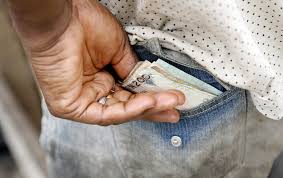
Curbing Vote buying Ahead of 2019 Elections
By Grace Omowumi Semudara
It is a fact that the season for the Nigerian general election is here. As we prepare for the forth-coming 2019 presidential election, there is need for us to clearly discern the difference between a free and fair election as opposed to vote-buying before and during the election.
Yes, election is not naira bet, just as one is expected to vote for who he or she wants, and not for the highest bidder.
Undoubtedly, election is supposed to be an environment for choosing a democratic leader who in turn is expected to render selfless service to the masses, but rather what we see today is patriotism in reverse order.
Interestingly, vote buying has become the latest trend during election, or so it seems. Citizens of this current generation see every approaching election as a golden opportunity to share and grab in whatever they can of the so called “national cake”.
Hence, vote buying became an “empowerment process” to both politicians and the voters. As things are in Nigeria today, where there is low level of literacy coupled with endemic poverty and unemployment, vote buying seems to be a ready alternative to poverty alleviation.
While it is easy to engage in vote merchandising, it is not also difficult to point out the menace of vote buying as it does not only bring about having mediocre in government but also lead to misrule, mis-governance and maladministration. Besides, those who succeed into office through vote buying will not serve the people well as they would be more interested in recovering their spent funds.
I am aware that the ‘dibo ko sebe’ (vote and cook soup) system in the just concluded Ondo state governorship election that ushered in the current Governor, Alhaji Gboyega Isyaka was seen as a one sided electoral fraud instigated by the All Progressive Congress (APC), using federal might to outsmart the main opposition, the Peoples Democratic Party (PDP).
In Ekiti guber poll last July, the political chicanery was named ‘see and buy’ with various parties’ foot soldiers invading polling units with bags of cash, they tricked voters and persuaded them to vote for their parties.
I must state that vote-buying is not the only act of corruption that takes place in the electoral process. Akin to that is the abuse of state resources, especially by political office holders. The misuse of coercive powers of the state such as the police, Department of State Services, and the military; the use of anti-corruption agencies such as the Economic and Financial Crimes Commission, Independent Corrupt Practices and other related offences Commission, the Code of Conduct Bureau to victimize and persecute political parties and candidates to publicly owned media are all forms of political corruption. It is incontrovertible that in the run-up to the 2019 elections, government institutions are being used against opposition political parties and candidates. Recent developments in Akwa Ibom State are pointers to these.
But going forward it is our collective responsibility as citizens and electorates to fight against this menace which has hindered good governance in our country.
The first step to take in achieving this, is to be conscious of the fact that selling our conscience to assuage immediate hunger will bring about future famine unless we seek contentment in what we have.
The security agencies as well as the Independent National Electoral Commission (INEC) will also do well not to condone vote buying during elections at polling centres.
Furthermore, the media can also help in playing a major role in eradicating this vice by enlightening the masses on the implications of vote buying to the future of the country.
Grace Omowumi Semudara is an intern with PRNigeria and Economic Confidential and can be reached via [email protected]
